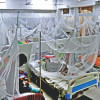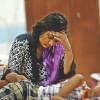Why the failure in stopping dengue?

The spread of dengue infection across the country seems to be relentless, and authorities' still-lax attitude and lack of action is making things worse. According to the Directorate General of Health Services (DGHS), at least 857 new dengue patients were hospitalised across the country in 24 hours till Monday morning, which is the highest number of daily recorded dengue cases in 2022 so far. At least 96 people have also succumbed to the disease, making this year's dengue death toll the third highest since the infection's first outbreak in 2000.
On top of this, hospitals are also reporting of their struggle to accommodate the increasing number of patients. Some are even turning patients away, while ailing individuals have to find a place for themselves on hospital floors due to a lack of beds for dengue patients. Multiple exposure to dengue, late admission to hospitals and late diagnosis of the virus have been cited by experts as being the main reasons for increasing dengue deaths.
But why have our authorities failed to prevent such a dengue surge this year, too? Only back in 2019, a staggering 1,01,354 dengue cases were recorded, while the death toll was 179. Previously believed to be more dangerous every other year, dengue seems to have broken that trend as it had infected at least 20,000 and claimed 70+ lives by October 2021, as per DGHS data. Given this reality, and the fact that dengue has been amidst us since May at least, there can be no excuse for authorities to be so woefully unprepared this year.
Most disappointingly, as we have mentioned in previous weeks and as healthcare experts have pointed out, the authorities' response to this crisis remains subpar. Though the Dhaka city corporations are constantly reassuring us that drives for public awareness and prevention (by way of destroying Aedes larvae in risky spots) are being conducted, they are clearly inadequate. While the city corporations can enter known dengue patients' homes and eradicate Aedes larvae from there, they cannot go into fenced under-construction buildings, which are one of the primary breeding grounds of the Aedes mosquito, meaning that the number of mosquitoes (and thus of infections) continues to rise.
We urge city corporations, local governments, and health sector authorities to utilise every available resource and assist hospitals in treating all dengue patients. Surely the Covid-19 pandemic and the dengue wave of 2019 have taught our authorities the seriousness of such public health crises and why they must be dealt with both proactively and reactively.


 For all latest news, follow The Daily Star's Google News channel.
For all latest news, follow The Daily Star's Google News channel. 









Comments